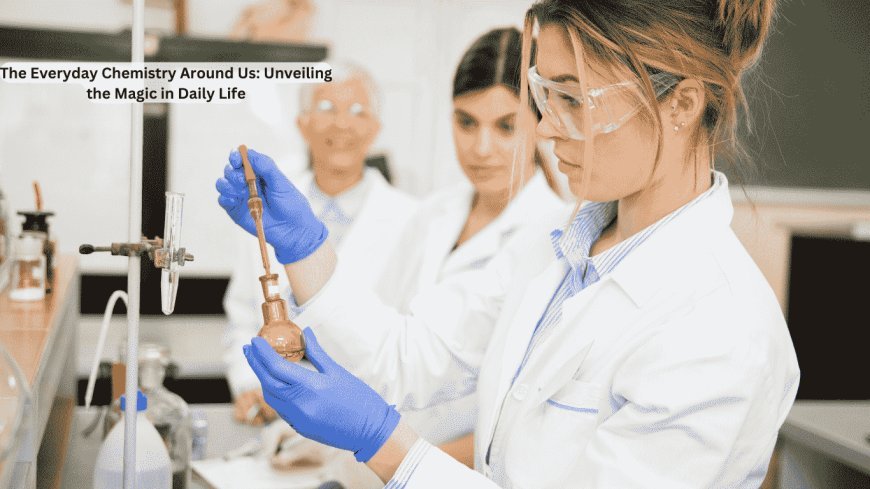The Everyday Chemistry Around Us: Discovering the Science Behind Daily Life
Explore how chemistry plays a vital role in our daily lives! From cooking to cleaning, discover the fascinating science behind everyday activities and how it impacts us.

Introduction
Did you realize chemistry goes beyond beakers and labs? It subtly affects everything from our food to our goods. Our world is woven together by chemistry, frequently without our awareness. Everyday things like soda fizz and detergent stain removal chemistry is both magical and
1. Chemistry in the Kitchen: The Heart of Everyday Science
Recipes are like scientific experiments, except they should taste well. You use chemistry every time you cook. So how:
-
Cooking and Heat Reactions:
The Maillard reaction is why your toast browns and smells so good. It’s a chemical reaction between amino acids and sugars that gives food that distinctive roasted flavor. -
Baking Magic:
Ever wondered how cakes rise? Baking powder or soda releases carbon dioxide when heated, creating tiny bubbles that make your cake fluffy. It’s pure chemistry in action! -
Acidity and Taste:
Adding lemon juice to a dish? That’s an acid interacting with other components to enhance flavor. The balance of acidity, sweetness, and salt is what creates a dish’s perfect harmony.
Imagine being a kitchen chemist who turns raw materials into gourmet delights next time you cook!
2. Cleaning Products: The Battle of Molecules
Chemistry is your weapon in home cleaning, a struggle of molecules. Soaps, detergents, and disinfectants help us stay clean using science.
-
How Soap Works:
Soap molecules have two ends: one that loves water (hydrophilic) and one that hates it (hydrophobic). When you wash your hands, the hydrophobic end attaches to grease or dirt, while the hydrophilic end helps rinse it away with water. Voilà—clean hands! -
Detergents and Stains:
Detergents are specially designed to break down stubborn stains by surrounding grease particles and lifting them off surfaces. That’s why your favorite shirt comes out looking brand new after a wash. -
Disinfectants:
When you spray disinfectant, chemicals like alcohol or chlorine kill bacteria and viruses by breaking down their cell walls. That’s chemistry safeguarding your health.
3. Health and Wellness: Chemistry in Your Bod
-
Caffeine and Energy:
That morning coffee that wakes you up? It’s caffeine at work. Caffeine blocks adenosine, a chemical that makes you feel sleepy, giving you that much-needed energy boost. -
Medicines and Healing:
From painkillers to antibiotics, medicines rely on chemistry to target specific areas of your body and alleviate symptoms. For example, aspirin works by inhibiting enzymes that cause pain and inflammation. -
Vitamins and Nutrition:
Ever wondered why vitamins are crucial? Each vitamin acts as a chemical helper in your body. Vitamin C, for instance, supports your immune system by aiding in the production of white blood cells.
4. Chemistry in Beauty and Skincare
Chemistry helped the beauty business. Every lotion, shampoo, and cosmetics product has precisely selected compounds to provide results.
-
Moisturizers and Hydration:
Most moisturizers contain compounds like glycerin, which attract water molecules to keep your skin hydrated. -
Sunscreen Protection:
Sunscreens use chemicals like zinc oxide or avobenzone to block harmful UV rays from damaging your skin. Without them, a sunny day could mean a painful sunburn. -
Shampoos and Conditioners:
Shampoos remove dirt and oil from your hair using surfactants, while conditioners contain compounds like silicones that smooth your strands and make them shiny.
5. Everyday Wonders: Chemistry Beyond the Obvious
Even mundane events include chemistry:
-
Why Soda Fizzes:
The bubbles in your soda come from carbon dioxide dissolved under pressure. When you open the bottle, the pressure is released, and the gas escapes, causing that satisfying fizz. -
Why Ice Melts on Roads:
Ever noticed how salt helps melt ice during winter? Salt lowers the freezing point of water, which means ice turns into water even in sub-zero temperatures. -
Why Fruits Ripen:
Ethylene gas triggers the ripening of fruits, making them softer and sweeter. That’s why
FAQs About Everyday Chemistry
1. Why is chemistry important in daily life?
Chemistry explains how food cooks, medications cure, and cleaning agents erase stains. Many of our procedures depend on it.
2. What’s a simple example of everyday chemistry?
Handwashing with soap is an example. The soap molecules break down filth and oil, enabling water to wash it away.
3. Is cooking really chemistry?
Absolutely! Cooking creates delectable meals via caramelization, Maillard reactions, and emulsification.
4. How does caffeine work in the body?
Caffeine helps you stay awake by blocking brain adenosine receptors.
5. How do detergents remove stains?
Surfactants in detergents remove grease and debris off surfaces for rinsing.

 Najmul Hasan
Najmul Hasan 





